Riccardo Muti conducting the Cherubini Orchestra in Lourdes at the 2022 Roads of Friendship concert.
© Marco Borrelli
On Monday, July 11, and Thursday, July 14, Riccardo Muti conducted concerts at two of Europe’s most significant holy sites. These performances were part of the Roads of Friendship, an annual project of the Ravenna Festival that has brought the healing power of music to symbolic locations every year since 1997. For 25 years and in 26 series of performances, Muti, the CSO’s Zell Music Director, has conducted Roads of Friendship concerts, referred to by Il Sole as an “unprecedented project,” in cities such as Beirut, Cairo, Damascus, Istanbul, Kyiv, New York, Sarajevo and Tehran, having “never skipped an episode, in all conditions and at any cost of time and effort,” the article continued.
Muti is deeply committed to the ongoing mission of these concerts. He recently commented that, “The pandemic has made us even more aware of our fragility and the universality of the experience of pain. But suffering is not the only language that knows no borders. Music transcends all cultural, linguistic and religious differences and can once again become an ambassador of peace and of solidarity.” Corriere Della Serra echoed this sentiment in its description: “This is a concert that one must ‘contemplate,’ not just listen. An event where spiritual sounds and symbols caress with a sense of mystery and humanity, going beyond musical boundaries to pose questions to the individual and the community.”
This year’s concerts were layered with meaning. The two venues, stages erected in front of the Sanctuary of Our Lady of Lourdes in France and the Holy House of Loreto in Italy, are the sites of pilgrimage for millions each year seeking healing as they pray at these shrines to the Virgin Mary. “In a place where faith invokes miracles and healings,” wrote Gregorio Moppi of La Repubblica, “the music suggests that it is rather the strength of humanity that prevails.”
The two concerts were dedicated to the Ukrainian city of Mariupol, the city of Mary, and the victims of all wars. A statement from the Ravenna Festival read, “The many faces of pain – of those fleeing a conflict, living with a disability, facing illness or mourning their loved ones – are answered by an ecumenical interweaving of voices, cultures and spirituality that finds unity in the most spontaneous of invocations: that to the Mother, image of all mothers.”
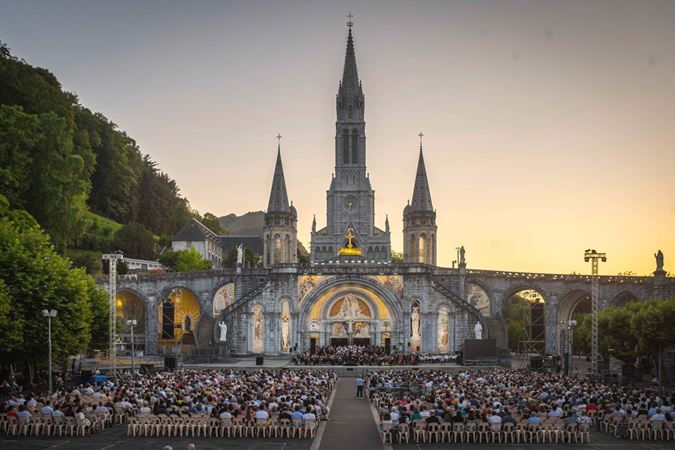
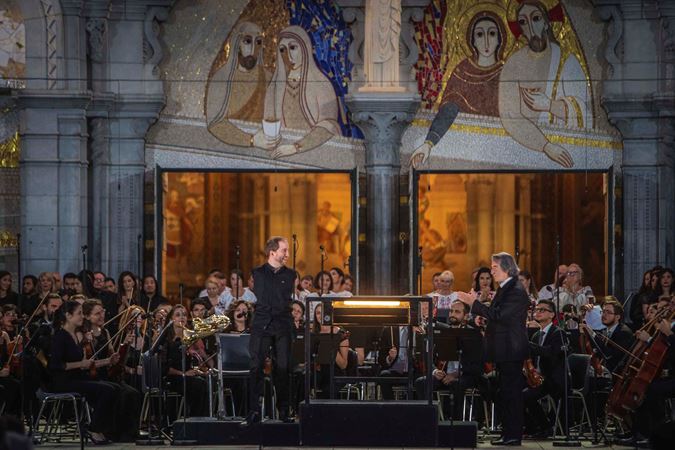
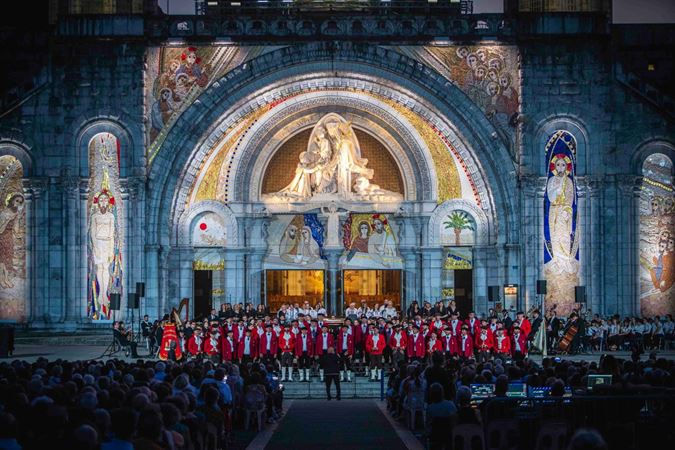
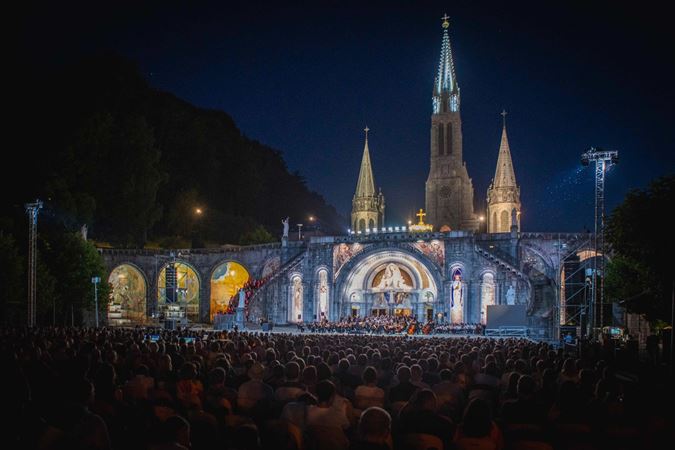
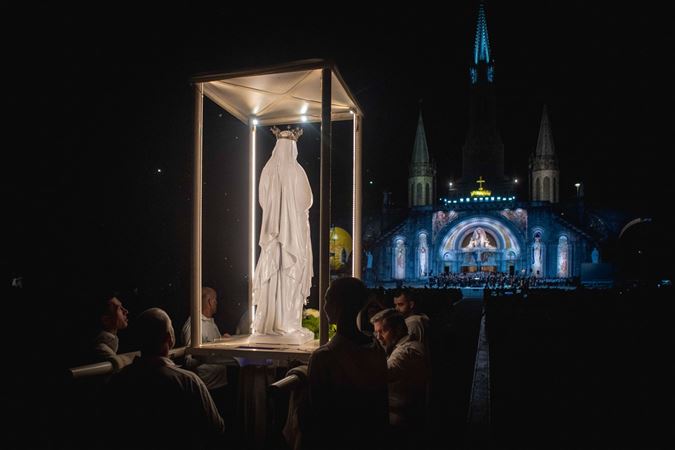
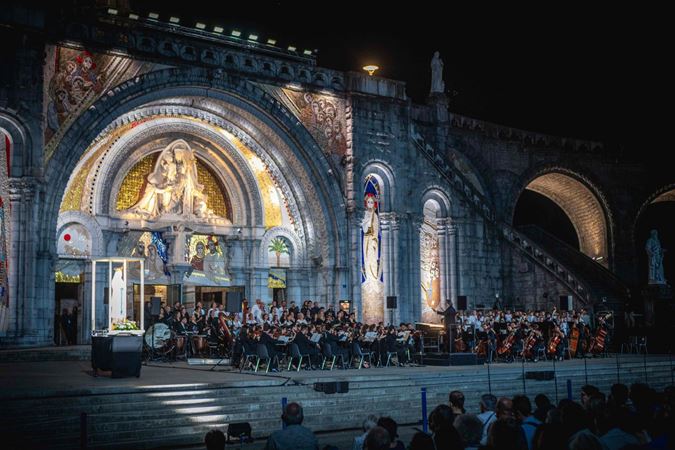
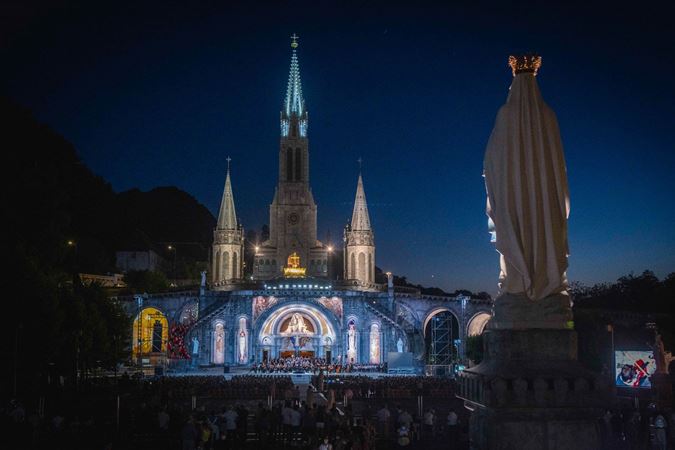
Artists from the chorus of the National Opera Theater of Ukraine “Taras Shevchenko,” directed by Bogdan Plish, joined Muti, the Luigi Cherubini Youth Orchestra and Italian singers of the Coro Cherubini and Coro Cremona Antiqua, led by Antonio Greco, for these performances. The same Ukrainian musicians had taken part in the Friendship Concert in Kyiv in 2018, at which time Muti was presented the State Award of Ukraine by President Petro Poroshenko. The musicians, who found refuge from the war in Ravenna thanks to the efforts of Muti’s wife, Cristina Mazzavillani, the founder of the Ravenna Festival, performed a traditional liturgical hymn from the 13th century and a piece by Hanna Havrylec, a composer who died of a heart attack days after the Russian invasion of Ukraine.
In addition, both programs featured Vivaldi’s Magnificat with soprano Arianna Vendittelli and alto Margherita Sala, Mozart’s Ave verum corpus as well as Verdi’s Stabat Mater and Te Deum. “Riccardo Muti . . . led a solemn and universal prayer, that of music, which speaks of beauty, brotherhood and of peace,” wrote Stefano Marchetti of Rassegna Stampa Caffè.
The concert in Lourdes was organized with L’Offrande Musicale, a festival that celebrates the natural beauty and cultural wealth of the Hautes-Pyrénéees and is committed to providing accessibility to its events for patrons with disabilities. Pianist David Fray, a native of nearby Tarbes, is the founder and artistic director of the festival. He is also a frequent soloist with the Chicago Symphony Orchestra and performer on the Symphony Center Presents series and married to Muti’s daughter, Chiara. This collaboration between the Ravenna and Offrande Musicale festivals resulted in the involvement of Felix Klieser and Beñat Achiary. Klieser is an exceptional German horn player, who, born without arms, uses his left foot to action the valves; Achiary is a Basque singer, who sang in both Basque and Occitan, the languages representing the two sides of the Pyrenees.
The regional choirs of les Chanteurs Pyrénéens de Tarbes and les Chanteurs Montagnards de Lourdes were also on stage performing in Occitan, the language in which, according to the tale of shepherdess Bernadette, the Virgin Mary spoke to her in the cave of Massabielle. This vision has made Lourdes one of the most visited pilgrimage destinations. “The music emphasized [the site’s] mysticism, and what music. The baton of Ricardo Muti, the untouched scenery, stirred great emotion on the esplanade in front of the lower basilica of Our Lady of the Rosary,” described Michela Tamburrino of La Stampa.
At the end of the Lourdes concert, silence fell upon the square during a procession of a statue of the Virgin clothed in light. This was followed by a performance of a hundred children from local schools singing Mozart’s Ave verum corpus. “Here is faith. I felt it clearly while conducting tonight,” Muti told Pierachille Dolfini for an article that was published by The Vatican News and Avvenire.
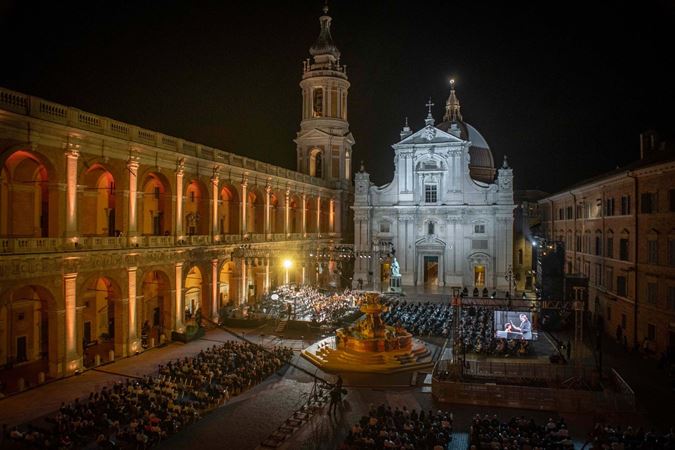
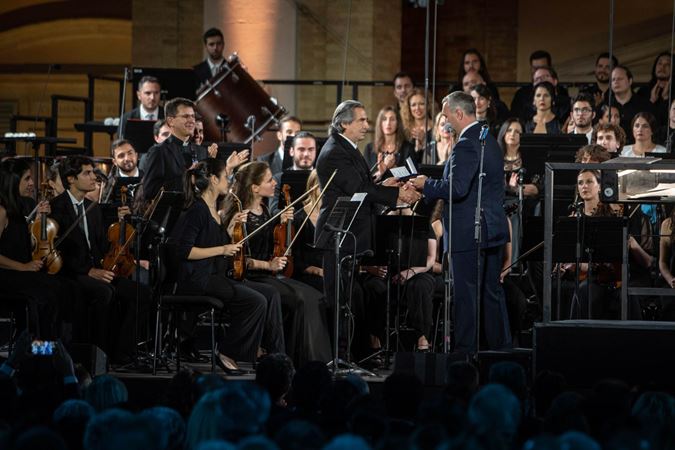
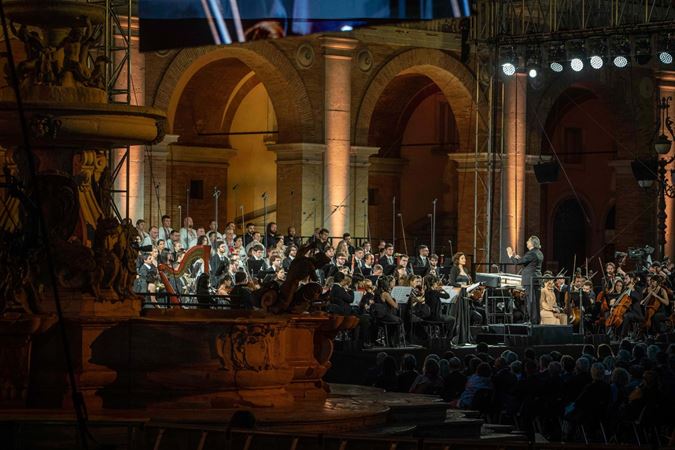
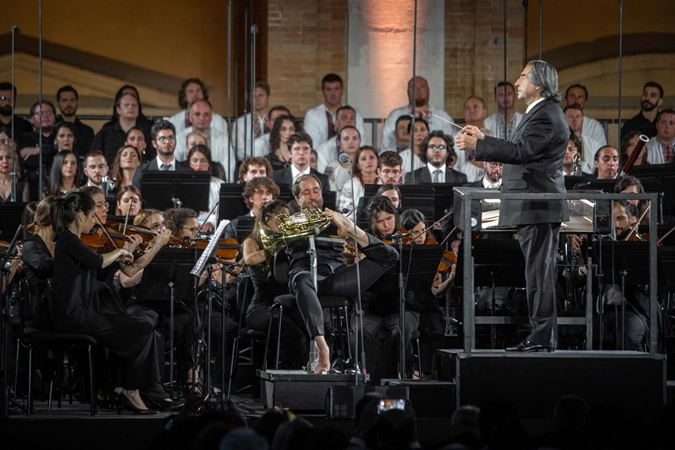
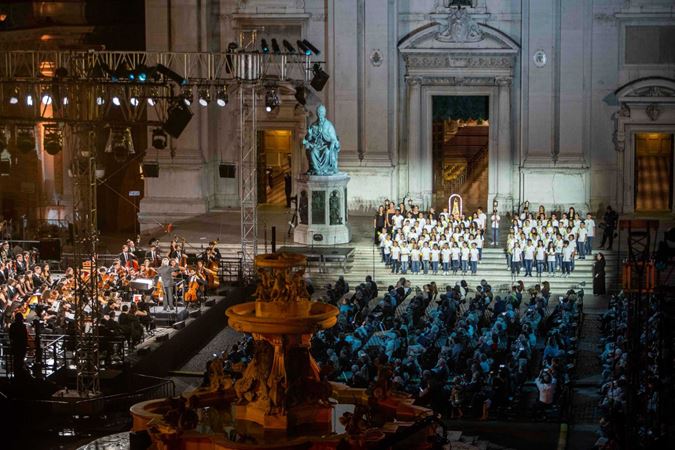
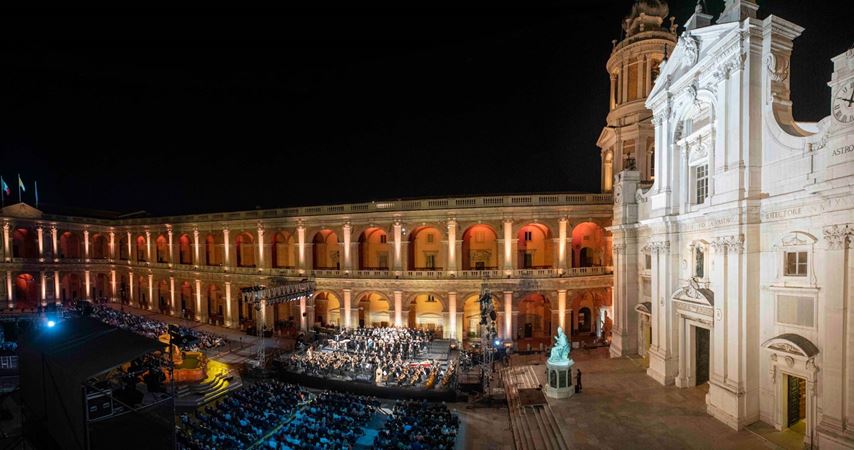
The concert in Loreto, which will be broadcast on Rai 1 on August 6, began with a special greeting sent by Pope Francis followed by a speech from the Ambassador of Ukraine to the Italian Republic, Yaroslav Melnyk, who presented Muti with an award as a foreign member of the Ukrainian National Academy of the Arts. In 2012, Muti was awarded the highest papal honor: the Knight of the Grand Cross First Class of the Order of St. Gregory the Great by Pope Benedict XVI.
A special stage was erected in front the Basilica della Santa Casa for the concert. Inside the basilica is the Marian shrine that contains the house where the Blessed Virgin Mary is believed to have lived and received the Annunciation. It was transported to Loreto in the 14th century and has been an important pilgrimage site since.
The medal presented to Riccardo Muti as a foreign member of the Ukrainian National Academy of the Arts on July 14, 2022
Riccardo Muti Music
The Papal greeting, sent via telegram, read: “The Holy Father Francis extends his cordial greeting to the participants of the Roads Friendship at the Ravenna Festival, [led by] Maestro Riccardo Muti, . . . with this Pontifical Delegation to spread a message of peace and fraternity. His Holiness expresses his appreciation for the significant event and, in spiritually joining it, encourages us to continue the commitment to rekindle hope in hearts and foster paths of solidarity and harmony through the universal language of music. With these sentiments, he is happy to send all those present his apostolic blessing, with a special thought for the orchestra and choristers.”
The performance that followed the two presentations included the sacred choral works featured at the performance in Lourdes as well as Kleiser’s performance of Mozart’s First Horn Concerto, K. 412, and songs sung by Beñat Achiary. A special visa was granted to Ukrainian bandura virtuoso and now soldier, Taras Stoly, to leave the front to perform in Loreto. In addition, present at the performance in Loreto were dancers of National Opera Theater of Ukraine. Similar to the Lourdes performance, the voices of children singing Mozart’s Ave verum corpus concluded the event, as the doors to the basilica were opened to reveal the Holy House and the famous reliquary featuring the Black Madonna of Our Lady of Loreto. The two works by Mozart were deliberate programmatic choices that celebrated the composer’s own pilgrimage to Loreto in July of 1770. The concert was followed by several minutes of applause and standing ovations for the artists who made the memorable evening possible.
The day before the performance Maestro Muti and his wife Cristina were invited to sign the distinguished guest book of the City of Loreto by the mayor Moreno Pieroni and the councilor for culture Francesca Carli. “At this moment, the world is boiling,” said Carli. “The events of the Roads of Friendship started in 1997 in Sarajevo, they are like drops of good in an ocean of evil. Music, with a capital M, it always has a soothing power.”


